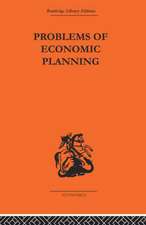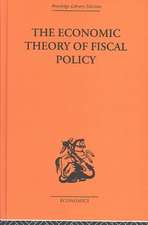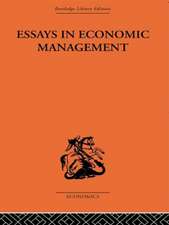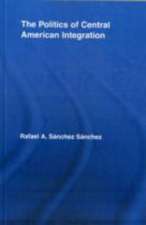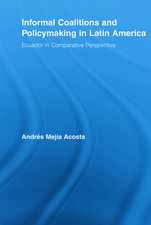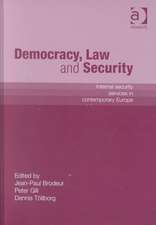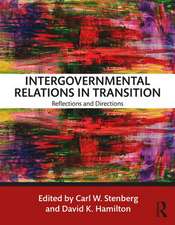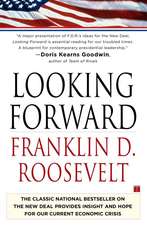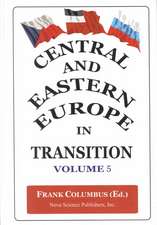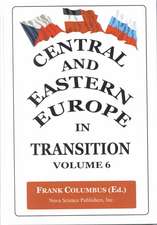The Political Economy of Contemporary Spain: From Miracle to Mirage: Routledge Frontiers of Political Economy
Editat de Luis Buendía, Ricardo Molero-Simarroen Limba Engleză Paperback – 14 aug 2020
Analyzing the causes and consequences of the continuing economic crisis in Spain, this book delves into five analytical axes: the evolution of the growth model; the role of Spain in the international division of labor; the financial sector and its influence on the rest of the economy; changes in the labor market; and the distributional consequences of both the expansive phase and the later crisis. Furthermore, contributors examine the formation of a triangle of actors (the government sector, building sector, and financial capital) that shaped the Spanish growth model, together with the effects of Spain’s membership in the Economic and Monetary Union. Also considering ecological problems, gender issues, and the immigration question, this book challenges the alleged recovery of living conditions during recent years, as well as the explanation of the crisis as the result of irrational behaviors or the greedy nature of certain actors.
The Political Economy of Contemporary Spain provides a coherent explanation of the Spanish economic crisis based on a pluralistic approach, while proposing several measures that could contribute to a transformation of Spain’s economic and social models.
| Toate formatele și edițiile | Preț | Express |
|---|---|---|
| Paperback (1) | 387.38 lei 6-8 săpt. | |
| Taylor & Francis – 14 aug 2020 | 387.38 lei 6-8 săpt. | |
| Hardback (1) | 762.97 lei 6-8 săpt. | |
| Taylor & Francis – 14 feb 2018 | 762.97 lei 6-8 săpt. |
Din seria Routledge Frontiers of Political Economy
-
 Preț: 309.90 lei
Preț: 309.90 lei -
 Preț: 309.79 lei
Preț: 309.79 lei -
 Preț: 316.03 lei
Preț: 316.03 lei -
 Preț: 152.66 lei
Preț: 152.66 lei - 9%
 Preț: 867.54 lei
Preț: 867.54 lei -
 Preț: 151.96 lei
Preț: 151.96 lei -
 Preț: 311.61 lei
Preț: 311.61 lei -
 Preț: 286.98 lei
Preț: 286.98 lei -
 Preț: 327.83 lei
Preț: 327.83 lei - 9%
 Preț: 1005.48 lei
Preț: 1005.48 lei -
 Preț: 325.09 lei
Preț: 325.09 lei - 9%
 Preț: 938.47 lei
Preț: 938.47 lei -
 Preț: 386.11 lei
Preț: 386.11 lei -
 Preț: 324.87 lei
Preț: 324.87 lei -
 Preț: 310.95 lei
Preț: 310.95 lei -
 Preț: 318.54 lei
Preț: 318.54 lei -
 Preț: 317.95 lei
Preț: 317.95 lei -
 Preț: 310.01 lei
Preț: 310.01 lei -
 Preț: 326.49 lei
Preț: 326.49 lei -
 Preț: 155.43 lei
Preț: 155.43 lei -
 Preț: 309.79 lei
Preț: 309.79 lei -
 Preț: 328.76 lei
Preț: 328.76 lei -
 Preț: 281.72 lei
Preț: 281.72 lei -
 Preț: 286.58 lei
Preț: 286.58 lei -
 Preț: 371.95 lei
Preț: 371.95 lei -
 Preț: 353.77 lei
Preț: 353.77 lei -
 Preț: 310.55 lei
Preț: 310.55 lei -
 Preț: 302.75 lei
Preț: 302.75 lei -
 Preț: 312.86 lei
Preț: 312.86 lei -
 Preț: 374.16 lei
Preț: 374.16 lei -
 Preț: 329.09 lei
Preț: 329.09 lei -
 Preț: 348.21 lei
Preț: 348.21 lei - 28%
 Preț: 1047.06 lei
Preț: 1047.06 lei - 18%
 Preț: 1169.45 lei
Preț: 1169.45 lei - 18%
 Preț: 1555.17 lei
Preț: 1555.17 lei - 18%
 Preț: 1048.43 lei
Preț: 1048.43 lei - 18%
 Preț: 1059.84 lei
Preț: 1059.84 lei - 31%
 Preț: 767.47 lei
Preț: 767.47 lei - 18%
 Preț: 731.92 lei
Preț: 731.92 lei - 26%
 Preț: 822.54 lei
Preț: 822.54 lei - 18%
 Preț: 1796.21 lei
Preț: 1796.21 lei - 26%
 Preț: 1184.91 lei
Preț: 1184.91 lei - 18%
 Preț: 1120.23 lei
Preț: 1120.23 lei - 15%
 Preț: 700.95 lei
Preț: 700.95 lei - 18%
 Preț: 1116.31 lei
Preț: 1116.31 lei - 22%
 Preț: 299.52 lei
Preț: 299.52 lei - 18%
 Preț: 999.46 lei
Preț: 999.46 lei - 18%
 Preț: 1169.78 lei
Preț: 1169.78 lei
Preț: 387.38 lei
Nou
Puncte Express: 581
Preț estimativ în valută:
74.12€ • 77.60$ • 61.33£
74.12€ • 77.60$ • 61.33£
Carte tipărită la comandă
Livrare economică 05-19 aprilie
Preluare comenzi: 021 569.72.76
Specificații
ISBN-13: 9780367592745
ISBN-10: 0367592746
Pagini: 174
Dimensiuni: 156 x 234 x 18 mm
Greutate: 0.4 kg
Ediția:1
Editura: Taylor & Francis
Colecția Routledge
Seria Routledge Frontiers of Political Economy
Locul publicării:Oxford, United Kingdom
ISBN-10: 0367592746
Pagini: 174
Dimensiuni: 156 x 234 x 18 mm
Greutate: 0.4 kg
Ediția:1
Editura: Taylor & Francis
Colecția Routledge
Seria Routledge Frontiers of Political Economy
Locul publicării:Oxford, United Kingdom
Public țintă
Postgraduate and UndergraduateCuprins
List of Figures and Tables, List of Contributors, Introduction: The Political Economy of the Spanish Growth Model and its Structural Adjustment Process, Luis Buendía and Ricardo Molero-Simarro. Chapter 1. The accumulation model of the Spanish economy: profitability, the real estate bubble and sectoral imbalances, Juan Pablo Mateo and Miguel Montanyà. Chapter 2. Spain’s external insertion: peripheral or not?, Manuel Gracia and María José Paz. Chapter 3. The Spanish financial sector: debt crisis and bailout, Eduardo Garzón Espinosa, Bibiana Medialdea García and Antonio Sanabria Martín. Chapter 4. The Spanish Labor Market. On the path of flexibility and wage devaluation, María Eugenia Ruiz-Gálvez and Lucía Vicent Valverde. Chapter 5. The distributive pattern of the Spanish economy: the impact of adjustment on inequalities, Luis Buendía, Ricardo Molero-Simarro and Javier Murillo Arroyo. Conclusion, Luis Buendía and Ricardo Molero-Simarro. Index
Notă biografică
Luis Buendía is Assistant Professor of Public Economics and Political Economy at the University of León, Spain. Since 2014, he has taken part in a project on the crisis in Southern Europe, financed by the Sheffield Political Economy Research Institute, and he has also been a member of the Steering Committee of the Asociación de Economía Crítica (Critical Economics Association).
Ricardo Molero-Simarro is Honorary Fellow at the Department of Applied Economics I (International Economics and Development) of the Complutense University of Madrid, Spain. He has also been a researcher at the School of Oriental and African Studies, UK, and the Peking University, China. His lines of research include aspects of income inequality, as well as monetary systems. In 2014, he was invited as a speaker to the Labour Economics after the Crisis Conference organized by the European Commission.
Ricardo Molero-Simarro is Honorary Fellow at the Department of Applied Economics I (International Economics and Development) of the Complutense University of Madrid, Spain. He has also been a researcher at the School of Oriental and African Studies, UK, and the Peking University, China. His lines of research include aspects of income inequality, as well as monetary systems. In 2014, he was invited as a speaker to the Labour Economics after the Crisis Conference organized by the European Commission.
Recenzii
"A volume rich in empirical detail and theoretical insight… The Spanish case is not as well known as some of the other austerity experiences in Europe and there is a wealth of empirical material here which, being theoretically grounded, represents a significant advance on our understanding of how austerity works in practice." - Stephen McBride, Review of Radical Political Economics
"This work, written in seven chapters by a diverse group of Spanish researchers who are specialists in their fields, is meticulously stitched together which makes it a pleasant and accessible read even for non-specialists. The resulting work is a reflection of the plurality, intensity and quality of current research in the field of economic science[...]" - Marta Cazorla, Papeles de Europa
'[This book] has the double advantage of combining powerful and interrelated analyses of different aspects of the Spanish economy with an easily understandable form of writing. Thanks to this, the book will be helpful to a wide range of readers, from students to advanced researchers in social sciences.' - Juan Barredo-Zuriarrain, Revista de Economia Critica
'In short, we find a text that is necessary, rigorous, well-structured and that, although pluralist in the different perspectives adopted by the authors of each chapter, maintains a theoretical coherence that speaks positively of the quality of the work carried out by the editors.' - Alfredo Macías Vázquez, Revista de Economía Mundial
'The book presented here not only offers a precise and accurate diagnosis of the ultimate roots of our present evils, but also advances a constructive program with the aim that, in the words of the editors, the lost decade does not end up becoming a forgotten generation.' - Pedro M. Rey Araújo, Papeles de relaciones ecosociales y cambio global
"This work, written in seven chapters by a diverse group of Spanish researchers who are specialists in their fields, is meticulously stitched together which makes it a pleasant and accessible read even for non-specialists. The resulting work is a reflection of the plurality, intensity and quality of current research in the field of economic science[...]" - Marta Cazorla, Papeles de Europa
'[This book] has the double advantage of combining powerful and interrelated analyses of different aspects of the Spanish economy with an easily understandable form of writing. Thanks to this, the book will be helpful to a wide range of readers, from students to advanced researchers in social sciences.' - Juan Barredo-Zuriarrain, Revista de Economia Critica
'In short, we find a text that is necessary, rigorous, well-structured and that, although pluralist in the different perspectives adopted by the authors of each chapter, maintains a theoretical coherence that speaks positively of the quality of the work carried out by the editors.' - Alfredo Macías Vázquez, Revista de Economía Mundial
'The book presented here not only offers a precise and accurate diagnosis of the ultimate roots of our present evils, but also advances a constructive program with the aim that, in the words of the editors, the lost decade does not end up becoming a forgotten generation.' - Pedro M. Rey Araújo, Papeles de relaciones ecosociales y cambio global
Descriere
The so-called ‘Spanish miracle’, beginning in the mid-1990s, eventually became a nightmare for the majority of the population, culminating in the present-day economic and political crisis. This book explores the main features of the Spanish political-economic model during both the growth and crisis periods.

